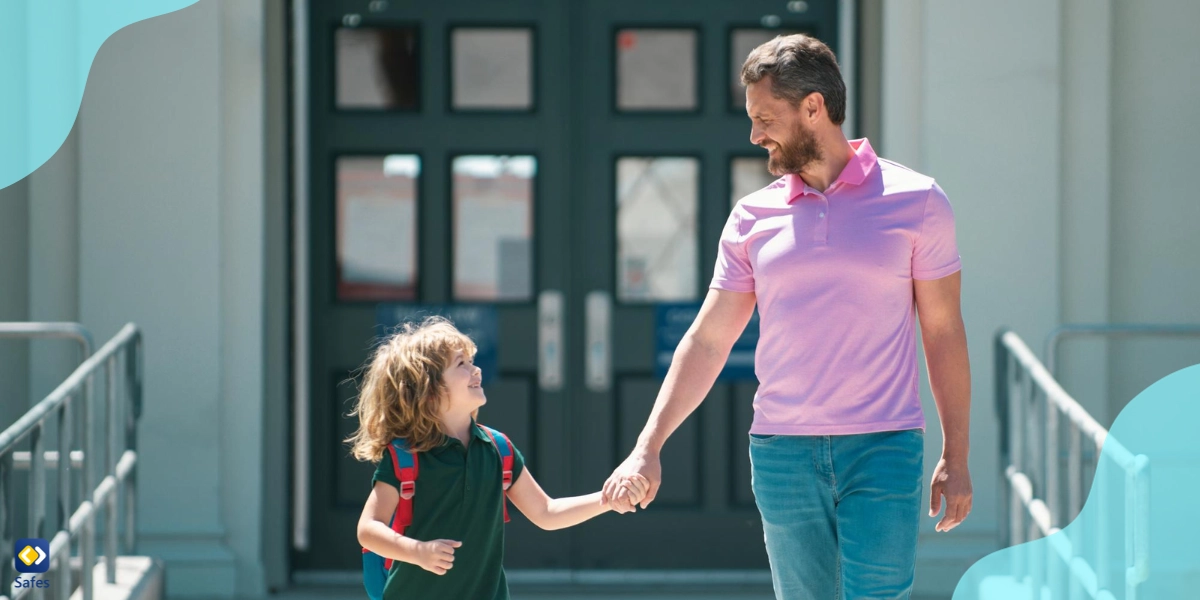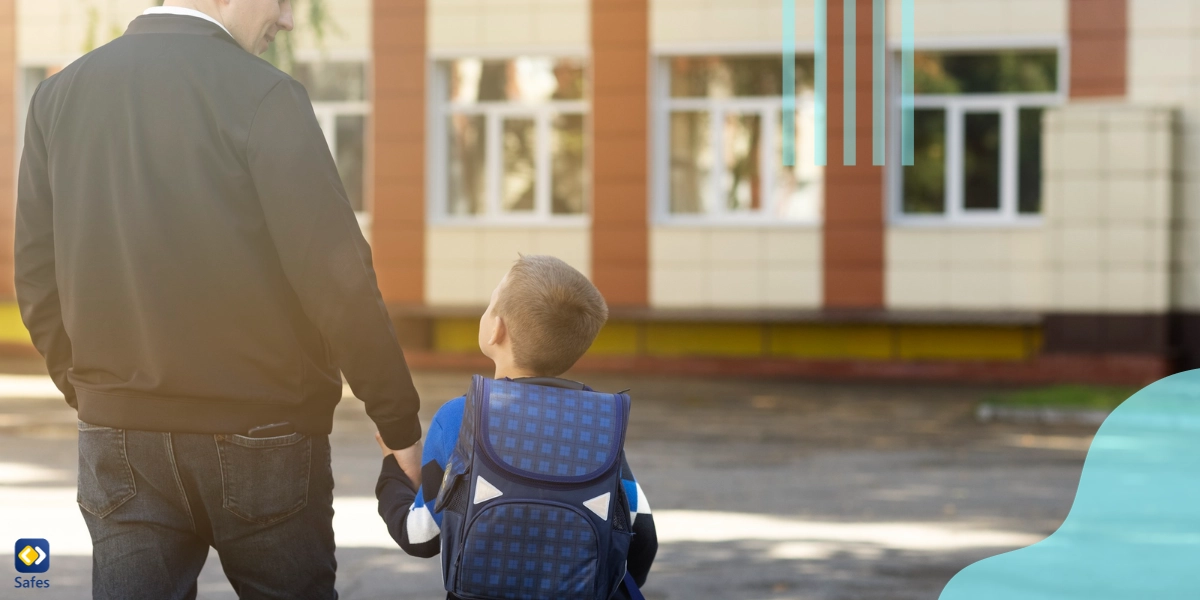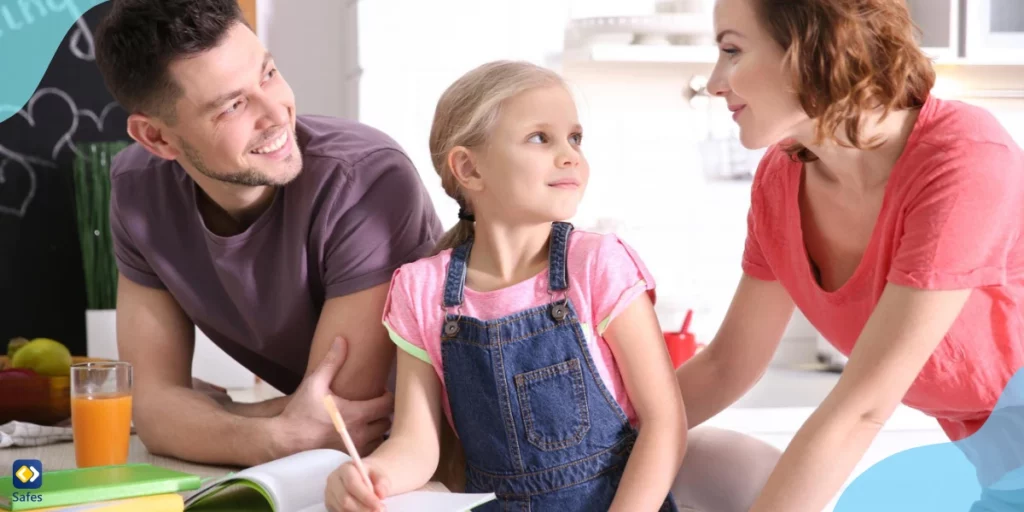In the evolving educational landscape, the synergy between community, parental influence, and parent involvement in schools plays a pivotal role. Through a closer look at this relationship, we see the profound effects of involved parents in enhancing a child’s academic journey and bolstering our communities. Delve deeper to grasp the full magnitude of this collaboration.
Download and Start Your Free Trial of the Safes Parental Control App

The Power of Parental Involvement
Building stronger communities is, without a doubt, intertwined with the prosperity of our educational institutions. Central to this vision is parental involvement, a factor that’s been pivotal in reshaping the academic and behavioral landscape of schools.
Firstly, it’s paramount to understand that when parents play an active role in their child’s education, it directly correlates to enhanced academic achievement. This isn’t just hearsay. A specific study of middle school students demonstrated that as parental involvement went up, absenteeism drastically reduced. In fact, children of involved parents were more likely to attend school regularly, which naturally boosts their academic chances.
Beyond just attendance and grades, parental involvement in education plays a crucial role in molding a child’s perspective toward learning. It’s not just about making them attend school but fostering an environment where they want to learn. A child, knowing that their parents are genuinely interested in their studies, experiences a significant boost in self-esteem and a renewed attitude towards school.
Furthermore, while school violence statistics often paint a grim picture, family involvement in schools has been shown to be a formidable antidote. The more engaged a parent is, the less likely the child is to engage in disruptive behaviors, such as bullying or fighting. The active participation of parents acts as an unspoken reinforcement of discipline standards, promoting healthy relationships between students, peers, and teachers.
On the softer side, family involvement naturally enhances communication skills. Regular dialogues between parents and educational institutions lead to an ecosystem where students feel supported, understood, and nurtured.
In conclusion, parental involvement isn’t just a mere addition to a child’s educational journey—it’s a cornerstone. When communities recognize and leverage this, we don’t just see improved grades, but the shaping of well-rounded, responsible, and motivated individuals, ready to take on the world.

Harmonizing Home and School: Target Areas for Schools
In today’s world, it’s essential for schools to feel less like institutions and more like extended families. Here’s how they can foster a deeper bond and seamlessly blend education with home life.
Digital Dialogues and Heartfelt Conversations
Effective communication isn’t about bombarding parents with information; it’s about making them feel connected. Utilizing modern avenues like online platforms combined with the timeless touch of newsletters can make a world of difference. Imagine parents looking forward to updates that paint a vibrant picture of their child’s day, academic progress, and upcoming school events. And let’s not forget the profound impact of face-to-face meetings. Parent-teacher conferences aren’t just formalities; they’re heartfelt conversations where teachers and parents come together, cherishing a student’s achievements and pondering over areas of improvement.
Blurring the Lines With Involvement
Nothing says “school as a home” like seeing parents actively engaged in school activities. From assisting in the classroom to leading extracurriculars or even joining field trips, their presence adds a touch of warmth. Schools can also host enlightening workshops, breaking down the nuances of today’s teaching methods or curriculum. After all, today’s math does look a tad different from yesteryear! And when parents have a say in school decisions, whether through parent-teacher associations or advisory committees, it underlines the fact that their voice truly matters.
Crafting an Inviting Ambiance
For a child wondering how to make friends at school or a parent curious about getting involved, the school’s environment plays a pivotal role. This sense of belonging comes alive when schools exude warmth and inclusivity. Schools can offer resources and strategies (some kind of “parent classroom”) to support learning at home. Infusing the academic calendar with family-centric events, be it cultural celebrations or open houses, reinforces the mantra of family engagement in schools. After all, education is a dance where every step is better with everyone involved.

Bridging School Halls and Home Walls: Target Areas for Parents
Schools play a pivotal role in shaping our children’s futures. However, family involvement in education can be the game-changer that elevates this experience to new heights. Parents aren’t just spectators; they’re integral players in this educational journey.
Beyond Attendance
Engaging with schools is more than just showing up at parent-teacher meetings or school events. It’s about immersing oneself in the child’s academic life. Staying in the loop about academic progress, upcoming activities, or even the nitty-gritty of daily homework assignments can make all the difference. And when there’s a hiccup or challenge, being proactive and reaching out to teachers can help smoothen the journey. After all, a stitch in time often saves nine.
Building an Educational Sanctuary
Beyond school, home plays an unparalleled role in a child’s learning. It starts with the basics, like setting a routine, ensuring there’s a quiet spot for studying and providing the necessary resources. But the magic happens in the daily interactions – discussing the day, encouraging reading, or simply understanding the motivation to do homework. This signifies the power of parents’ support at home, echoing as performance in school.
Homeschool Partners in True Essence
When we talk about ‘parent involvement vs parent engagement’, it’s the collaboration that truly underlines the difference. Actively collaborating with teachers, understanding a child’s learning curve, and being a part of school initiatives amplify the homeschool partnership. Kraft and Dougherty’s research in 2013 revealed an interesting facet: when families actively communicated with teachers, student engagement soared, with homework completion rates rising and classroom disruptions reducing. By being active participants in school committees or advocating for their child’s unique needs, parents pave the way for a holistic educational experience.

Safes App to the Rescue
In today’s digital era, aiding parent involvement in schools requires modern solutions. Enter Safes, our intuitive parental control app, designed with today’s tech-savvy parents in mind. With Safes, you’re not just supervising screen time but engaging in your child’s digital journey. Whether it’s keeping an eye on homework apps, fostering healthy online habits, or ensuring they access only age-appropriate content, Safes is your digital companion in nurturing a balanced educational experience. It bridges the gap between digital learning and parental oversight, promoting a synergy that’s truly 21st century. Ready to redefine parental engagement? Download Safes now for iOS or Android. Try Safes for free and make a lasting impact.
Conclusion
In understanding the nexus between parental influence and parent involvement in schools, it becomes evident that a child’s educational journey is enriched by this collaboration. Engaged parents not only enhance academic outcomes but also foster a stronger sense of community. As schools and families converge in their goals, the results are unmistakable: more motivated students, resilient communities, and a brighter future for the next generation. The path forward is clear: together, we achieve more.
Your Child’s Online Safety Starts Here
Every parent today needs a solution to manage screen time and keep their child safe online.
Without the right tools, digital risks and excessive screen time can impact children's well-being. Safes helps parents set healthy boundaries, monitor activity, and protect kids from online dangers—all with an easy-to-use app.
Take control of your child’s digital world. Learn more about Safes or download the app to start your free trial today!




